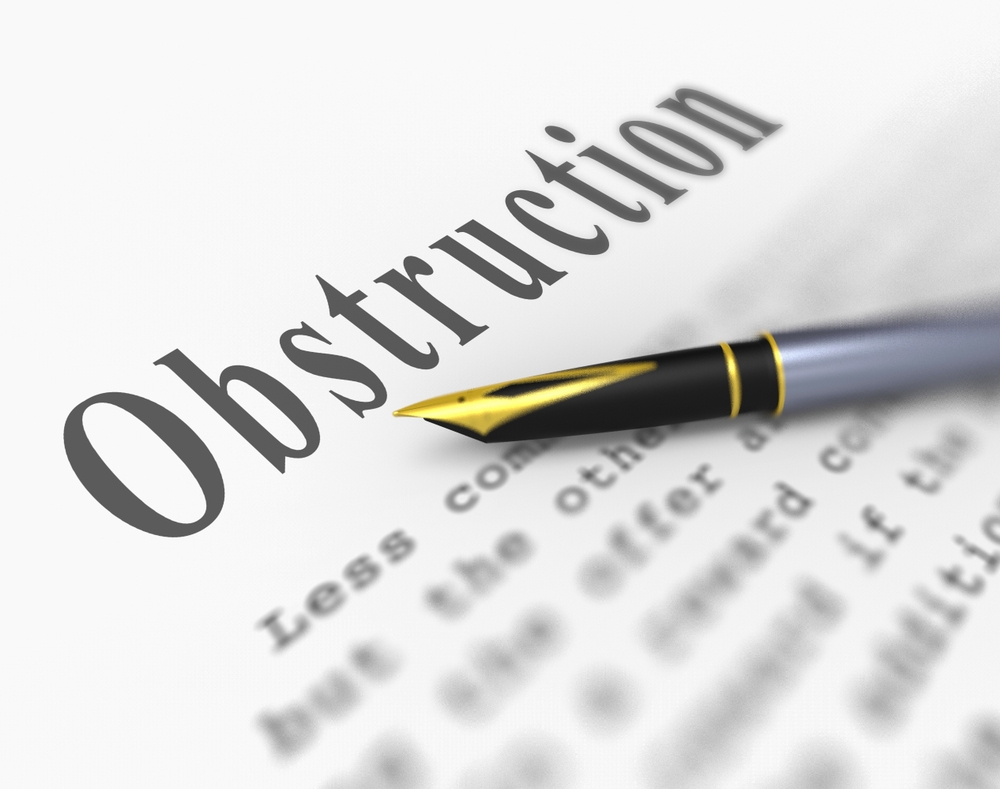Interfering with police is a serious matter. Obstructing justice can occur when a person is hoping to protect a friend or family member who he/she feels is innocent. It can also occur when a person is scared and worried about being charged with a crime, even if he/she did nothing wrong.
One of the most common ways a person can be charged with obstruction is simply by running away from police!
Regardless of why it happened, obstruction of justice is a crime that could land a person behind bars, result in a criminal record, and forever mark someone as a vagrant in the eyes of law enforcement officials. Consequently, it is crucial to understand what obstruction of justice truly is and the penalties associated with it.
 What is Obstruction of Justice
What is Obstruction of Justice
New Jersey labels “Obstruction of Justice” as “Obstructing the Administration of Law,” but both terms mean the same thing. It is also sometimes called obstructing a criminal investigation. Regardless of the term, obstruction is a very broad crime that involves almost any interference with a police officer’s attempt to carry out his/her job.
More specifically, under N.J.S.A. 2C:29-1, obstructing the administration of law involves purposefully obstructing, impairing, or perverting the administration of law (or another governmental function) or attempting to prevent (or actually preventing) a public servant from lawfully performing an official function by means of flight, intimidation, force, violence, physical interference, or through any independently unlawful act.
The key here is the method of interference that the law prohibits. As noted above, flight, intimidation, force, violence, physical interference, and independently unlawful acts are the types of obstruction that the law penalizes. This means any act of interference that is not a crime of its own (an “independently unlawful act”) or one of the other methods of interference cannot be considered obstructing the administration of law.
For example, New Jersey courts have determined that mere words are not enough to constitute an interference that could give rise to a charge for Obstructing the Administration of Law. Likewise, in order to get convicted, a person must have taken an affirmative step to actually prevent the officer from doing something.
Examples of things that can be considered obstruction are:
- Lying to police
- Threatening an officer, witness or juror
- Refusing to allow police to enter a building when they have a warrant
- Locking away or hiding evidence
- Providing false evidence
Obstruction charges are often coupled with other charges, such as fleeing police, resisting arrest, tampering with evidence, perjury, and criminal coercion. Often these are the very same actions that were also responsible for the obstruction charge.
Lastly, a person’s interference must have prevented the officer from doing something he/she had the proper legal authority to do. As such, preventing an officer from doing something unlawful will not usually amount to Obstructing the Administration of Law.

 Penalties and Fines
Penalties and Fines
The penalties and fines associated with obstruction of justice vary depending on the charge. A person may be charged with either a fourth-degree crime or a disorderly person’s offense so let’s take a look at the consequences of both:
Disorderly Persons Offense
- Obstructing the administration of law (i.e., Obstruction of Justice) is usually charged as a disorderly person’s offense.
- If the crime is charged as a disorderly person’s offense, the penalties can include up to 6 months in jail and a fine of up to $1,000.
Fourth-Degree Crime
- If a person obstructs the detection or investigation of a crime or the prosecution of a person for a crime, he/she can be charged with a fourth-degree crime.
- If the crime is elevated to a fourth-degree crime, the penalty can be up to 18 months in prison and a fine of up to $10,000.
In addition, a conviction results in a criminal record. This will make getting a job (or keeping one) difficult. Therefore, be sure to contact an experienced New Jersey criminal defense attorney who can help avoid the conviction in the first place.
 Consequences for a First Offense
Consequences for a First Offense
Technically, obstruction of justice is one of many offenses that carry a presumption of non-incarceration. This means in most circumstances a person can expect a sentence that does not include jail time for a first offense.
However, judges and police see obstruction as a serious matter that makes it difficult to do their jobs properly. As such, it would be unwise to presume that a person can plead guilty to obstruction and avoid going to jail.
Further, a guilty plea also ensures that a person will have a permanent criminal record and the stigma that comes with it. Before accepting a conviction for obstructing justice, contact an experienced criminal defense attorney who can evaluate the case and develop an effective strategy that will minimize the consequences.
 Consequences for Juveniles
Consequences for Juveniles
Children under the age of 18, especially those who may be distrusting of police for any reason, need to be mindful of their rights. However, they also need to be aware of what actions they can take that can be considered Obstructing the Administration of Law.
Remember, to be convicted of obstruction, one must have interfered in a manner that was violent, threatening, physical, or otherwise unlawful. If a child has done something that crosses this line, he/she can be facing serious consequences that will harm them well into adulthood.
Any parent or guardian whose child has been charged with Obstruction of Justice must get immediate help from a skilled criminal defense attorney.
What if You’ve Been Charged With Obstruction of Justice?
A person charged with Obstructing Justice is facing very serious accusations. It is critical that a person have a skilled criminal defense attorney evaluate his/her case. An attorney can consider the facts and develop a defense strategy with the best chance of avoiding a conviction and keeping the accused out of jail.
An attorney will know what truly constitutes obstruction under the law and what does not. For example, refusing the answer an officer’s questions is not obstruction, regardless of whether or not one is a suspect—you have the right to remain silent!

Contact an Attorney
While there may be a number of ways to fight obstruction of justice charges, it starts with retaining an attorney who you can trust. They will navigate the legal landscape for you, and deal with the paperwork and complexities of the legal process. Therefore, the quicker you find an attorney, the faster you can begin dealing with the charges.
Pre-Trial Intervention (PTI)
Pre-Trial Intervention may be available to a person depending on the circumstances. It is normally available to people with no priors who would be able to avoid prosecution. Instead, they would have the option of participating in rehabilitative programs, community service and/or other similar programs. This is a tremendous opportunity for a person to avoid having a criminal record, and is a much faster process than going to trial. However, there are strict requirements on eligibility for the program, and at times, they may be unavailable. For example, if a person has a prior conviction, or if they have previously participated in a PTI, then they would be ineligible.
The application process is not simple and involves an interview with the Criminal Division of the Superior Court. This alternative may be a possibility for you, but this is something that an attorney would be able to determine once they know the full circumstances surrounding your case and background. Please see our other page which further details the PTI process in New Jersey.
Expunge Obstruction of Justice Charge
A person who has already been convicted of Obstruction of Justice may be eligible to have the criminal record cleared. Filing for an expungement (as New Jersey calls it) is not a simple process and not all who apply get their criminal records cleared. The most important first step in determining if one is eligible for expungement is to learn more about the process. The second is to contact an attorney with experience filing expungement petitions in New Jersey.
 Case Law Analysis
Case Law Analysis
 Who Should I Contact?
Who Should I Contact?
If you or a loved one has been charged with Obstructing the Administration of Law (i.e. Obstruction of Justice in NJ), contact the attorneys of Rosenblum Law. Our team of New Jersey criminal defense attorneys will do what they can in order to protect your legal rights and fight to keep you out of prison. E-mail or call 888-815-3649 today.
 Frequently Asked Questions
Frequently Asked Questions
Yes. A person can be sent to jail for up to 6 months, or to prison for up to 18 months depending on the severity of the charge.
Obstructing the Administration of Law (a.k.a. Obstruction of Justice) in New Jersey can be charged as either a disorderly persons offense or an indictable offense (which is equivalent to a felony in other states).
A person can be charged with Obstruction of Justice if he/she interferes with the administration of law in a manner that involves flight, threats, violence, physical action or any independently unlawful act.
Tampering with Evidence (2C:28-6) is different from Obstructing Justice (2C:29-1). However, a person who tampers with evidence could be charged with both offenses, depending on the circumstance.
The New Jersey statute for Hindering (2C:29-3) alleges that a person attempted to prevent law enforcement from apprehending a suspect. This is not necessarily the same as obstructing justice, although in some circumstances a person could be charged with both.










 888-815-3649
888-815-3649
